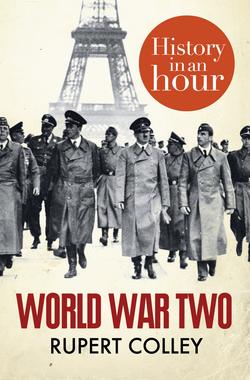Читать книгу World War Two: History in an Hour - Rupert Colley - Страница 11
ОглавлениеThe Mediterranean: ‘One moment on a battlefield is worth a thousand years of peace’
Since coming to power in 1922, Benito Mussolini fancied himself as a modern-day Caesar and Italy his Roman Empire. In his bid to start building an empire worthy of his ancient predecessors, Italy grabbed for itself Ethiopia (then Abyssinia) in 1936 and Albania in 1939. On 16 May 1940, Churchill had pleaded with Mussolini not to declare war: ‘Is it too late to stop a river of blood from flowing between the British and Italian peoples?’ he asked. But just three weeks later, on 10 June, with France only days from capitulating, Mussolini declared war on the Allies, boasting, ‘One moment on a battlefield is worth a thousand years of peace’, and prompting Hitler to comment: ‘First they were too cowardly to take part. Now they are in a hurry so that they can share in the spoils.’ On 28 October, from their bases in Albania, Italy attacked Greece. Mussolini’s dreams of empire soon unravelled in humiliating fashion. With insufficient weapons, lack of winter clothing and supplies, the Italians faltered within fifty miles. The Greeks, with help from the British, pushed the Italian forces into a hasty retreat, carrying the fight into Albania. Having dealt with the Italians, the Greeks now faced the more daunting prospect of a German attack.
From 6 April 1941, the Germans poured into Greece, and by the twenty-third Greece had surrendered, their prime minister having shot himself while the swastika flew over the Acropolis. British forces in Greece withdrew to Crete, which in turn was also crushed by the Nazis, forcing another evacuation for the British. The Greeks were to suffer terribly under the Germans, enduring routine barbarism and murder (only 2 per cent of Greece’s Jewish population survived the war) and large-scale starvation.
Romania’s supply of petrol was vital to the German war machine, and in September 1940, Germany disposed of Romania’s king, and gave its support to a fascist government, who started on an enthusiastic campaign against the Jews. In November 1940, Romania joined the Axis, and in June 1941 they began their campaign against the Soviet Union.
In March 1941, Yugoslavia had signed the Tripartite Pact with Germany, Italy and Japan, but following massive public protest and a coup d’état in which Prince Paul was overthrown, rescinded the following day. Furious, Hitler ordered the destruction of Yugoslavia. Attacking on 6 April, Belgrade was flattened with nearly 4,000 civilians killed by 12 April. It took Axis forces only eleven days to force a surrender. The Germans gave Croatia their independence as a fascist republic and the collaborationist Croatian government hounded their Jews with brutal relish. In the remaining part of Yugoslavia, communist partisans, led by Josip Broz (‘Tito’), and Chetnik rebels fought the Germans and each other with equal intent.
